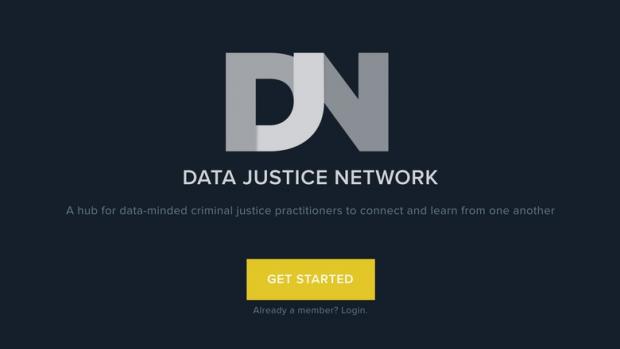The Governance Lab at NYU Tandon Launches a Network to Connect Criminal Justice Community for Data-Driven Reform
The Data Justice Network to Become a Hub for Learning What Works and Fostering Information-Sharing and Innovation

The Governance Lab (The GovLab) at the NYU Tandon School of Engineering has launched the Data Justice Network (datajustice.us). The website fosters peer-to-peer learning among criminal justice practitioners and policymakers and helps officials get fast and comprehensive answers to their questions about how to make better use of data to reduce incarceration and crime.
Built by the GovLab with support from the Laura and John Arnold Foundation (LJAF) and in collaboration with The Justice Management Institute, the website was designed for practitioners by practitioners to ensure that the platform is both useful and simple. Advisors to the project included leaders from Code for America, the Pew-MacArthur Results First Initiative, the National Association of Counties, and heads of criminal justice coordinating councils in 22 jurisdictions.
“Criminal justice data are collected by multiple agencies, stored in different formats, and maintained in various systems,” LJAF Vice President of Criminal Justice Matt Alsdorf explained. “The lack of data coordination makes it difficult for jurisdictions to analyze information and evaluate the effect of their local criminal justice policies. We are pleased to support the Data Justice Network and believe that it can help to address this issue and make it easier for communities to use data and predictive analytics to safely reduce their jail populations.”
On the website, criminal justice practitioners can search for colleagues with relevant experience, ask and answer questions, and track their own knowledge of innovative ways of using data at every stage of the criminal justice process.
“Being able to use data effectively and responsibly is extraordinarily important,” said Beth Simone Noveck, GovLab Director and the Jerry M. Hultin Global Network Professor at NYU Tandon. “Data can help policymakers understand past performance of public policies and services – both their efficiency and their disparate impact. More data enables the delivery of more tailored interventions in the present by making it possible, for example, to identify and divert someone suffering from mental illness or substance abuse into appropriate treatment and out of jail. Better access to data even helps with foretelling future outcomes such as predicting who is likely to recidivate.”
With Data Justice Network, participants can easily get help and advice from those with experience to explore issues such as
- How can data be used to create a better post-arrest diversion process for the mentally ill and reduce time spent in jail?
- How can better data be collected about the number of mentally ill or substance abusers in county jails?
- What is the best way to develop algorithms to predict super-utilizers of the criminal justice system?
“We hope practitioners will sign up, share their knowledge, and learn from one another to improve our criminal justice system and the communities it serves,” said Elaine Borakove, President of the Justice Management Institute.
Data Justice is open to criminal justice policymakers and practitioners. To sign up, visit datajustice.us.
About the Governance Lab at NYU Tandon
The GovLab’s mission is to improve people’s lives by changing the way we govern. Our goal is to strengthen the ability of institutions – including but not limited to governments – and people to work more openly, collaboratively, effectively, and legitimately to make better decisions and solve public problems. We believe that increased availability and use of data, new ways to leverage the capacity, intelligence, and expertise of people in the problem-solving process, combined with new advances in technology and science, can transform governance. We approach each challenge and opportunity in an interdisciplinary, collaborative way, irrespective of the problem, sector, geography, and level of government. For more information, visit www.thegovlab.org.
About the New York University Tandon School of Engineering
The NYU Tandon School of Engineering dates to 1854, the founding date for both the New York University School of Civil Engineering and Architecture and the Brooklyn Collegiate and Polytechnic Institute (widely known as Brooklyn Poly). A January 2014 merger created a comprehensive school of education and research in engineering and applied sciences, rooted in a tradition of invention and entrepreneurship and dedicated to furthering technology in service to society. In addition to its main location in Brooklyn, NYU Tandon collaborates with other schools within NYU, the country’s largest private research university, and is closely connected to engineering programs at NYU Abu Dhabi and NYU Shanghai. It operates Future Labs focused on start-up businesses in downtown Manhattan and Brooklyn and an award-winning online graduate program. For more information, visit engineering.nyu.edu.
About The Justice Management Institute
The Justice Management Institute (JMI) provides cutting-edge research, education and training programs, and technical assistance in justice policy, planning, and operations. JMI offers innovative approaches and solutions for advancing knowledge and practice in the administration of justice. JMI’s work is guided by three principles—Think, Inspire, Change. Founded in 1993 in Denver, Colorado, JMI is a non-profit organization, now based in Arlington, Virginia, that works all over the country on a range of projects at the local, state, and federal level, and is sought after internationally as well. As the home of the National Network of Criminal Justice Coordinating Councils (NNCJCC), JMI is the nationally recognized expert on criminal justice coordinating councils (CJCC’s) and guiding CJCC’s to implement meaningful, sustainable improvements across the criminal justice system. For more information, visit www.jmijustice.org.




